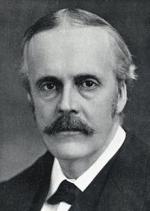Disable ads!
Arthur Balfour
Arthur James Balfour, 1st Earl of Balfour, KG, OM, PC, DL (UK /ˈbælfə/; 25 July 1848 – 19 March 1930) was a British Conservative politician who was the Prime Minister of the United Kingdom from July 1902 to December 1905. When he came into his inheritance at 21, Balfour became one of the wealthiest young men in Britain. He rose to prominence by suppressing agrarian unrest in Ireland through punitive action combined with measures against absentee landlords. In July 1902 he succeeded his uncle, Lord Salisbury as Prime Minister and leader of a Conservative Party that had won two successive landslide majorities, but suffered by virtue of public antipathy to the Boer war. Boer farms on the veldt supplying the guerrillas had been countered by British use of black South Africans as armed scouts, and many were reluctant to go back to mine work at the war's end. Balfour authorised the importation of Chinese labour under conditions that were criticised as slavery. Balfour was seen as an ambivalent personality and a weak Prime Minister. His embrace of the imperial preference championed by Joseph Chamberlain was nuanced, but brought resignations and the end of his spell as party leader. He opposed Irish Home Rule, saying there could be no half-way house between Ireland remaining within the United Kingdom or becoming independent. He oversaw the Entente Cordiale, an agreement with France that influenced Britain's decision to join the First World War. In 1915 he became Foreign Secretary in David Lloyd George's wartime administration, but was frequently left out of the inner workings of government, although the declaration of 1926 giving a measure of independence to the Dominions bore his name. He resigned as Foreign Secretary following the Versailles Conference in 1919, dying 19 March 1930 aged 81, having spent an inherited fortune. He never married. Balfour trained as a philosopher – he originated an argument against believing that human reason could determine truth – and had a detached attitude to life, epitomised by a remark attributed to him: "Nothing matters very much and few things matter at all".
 Read more on wikipedia.org Read more on wikipedia.org
 All quotes by Arthur Balfour All quotes by Arthur Balfour
 Edit Edit
|

|
|
|
|
|
Background photo by Giuliana
|